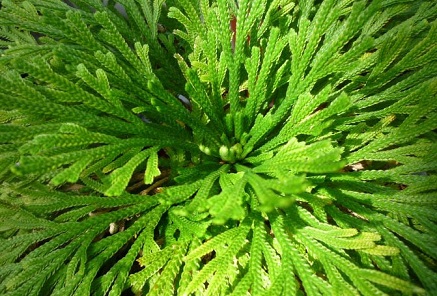South Korean researchers identify Amentoflavone from Selaginella Tamariscina as a potential inhibitor of the COVID-19 virus
Nikhil Prasad Fact checked by:Thailand Medical News Team Sep 02, 2024 6 months, 4 weeks, 1 day, 14 hours, 17 minutes ago
Herbs And Phytochemicals: In the ongoing battle against COVID-19, researchers are continuously searching for effective and affordable treatments. While vaccines and antiviral drugs are available, the rapid emergence of new variants of the SARS-CoV-2 virus highlights the need for additional therapeutic options. A recent study by a team of scientists from Yonsei University and Chungnam National University in South Korea has revealed promising results using an extract from the herbal plant Selaginella tamariscina. This
Herbs And Phytochemicals news report delves into the details of this groundbreaking study and its implications for future COVID-19 treatments.
 South Korean researchers identify Amentoflavone from Selaginella Tamariscina
South Korean researchers identify Amentoflavone from Selaginella Tamariscina
as a potential inhibitor of the COVID-19 virus
The Search for New Treatments
SARS-CoV-2, the virus responsible for COVID-19, is an RNA virus known for its high mutation rate. This ability to rapidly evolve into new variants has made it challenging to develop long-lasting treatments. Current antiviral drugs, such as Paxlovid and Molnupiravir, target specific viral enzymes like RNA-dependent RNA polymerase (RdRp) and 3CL-protease. However, these drugs can have significant side effects, and their effectiveness may diminish as new variants emerge.
In response to these challenges, the researchers turned to traditional herbal medicine in their search for new antiviral compounds. Selaginella tamariscina, a plant used in Asian medicine for centuries to treat various ailments, was identified as a potential source of antiviral compounds. The extract from this plant, known as Selaginella tamariscina extract (STE), was tested for its ability to inhibit the activity of SARS-CoV-2 RdRp.
Key Findings of the Study
The study's key findings revealed that STE significantly inhibits the activity of SARS-CoV-2 RdRp in a dose-dependent manner. The inhibitory effect was measured using an RdRp assay, which showed that STE could reduce the activity of this crucial viral enzyme. The study determined that the half-maximal inhibitory concentration (IC50) of STE for SARS-CoV-2 RdRp was 98.04 μg/mL, indicating its potent antiviral properties.
The researchers also investigated whether STE could inhibit coronavirus replication. Using the human coronavirus OC43 strain, which is similar to SARS-CoV-2, they found that STE treatment reduced the replication of the virus in infected cells. This was evident from the decrease in viral protein levels in the conditioned media, as measured by Western blot analysis. Furthermore, quantitative reverse transcription polymerase chain reaction (qRT-PCR) confirmed that STE treatment led to a significant reduction in the levels of coronavirus RNA in the conditioned media.
The Role of Amentoflavone
The research team further explored the active compounds in STE that contributed to its antiviral effects. Through qualitative analysis, they identified amentoflavone as the primary
active compound in STE. Amentoflavone is a naturally occurring biflavonoid known for its various pharmacological properties, including anti-inflammatory, antioxidant, and antiviral activities.
In this study, amentoflavone was shown to significantly inhibit the activity of SARS-CoV-2 RdRp, with an IC50 of 13.17 μM. This inhibitory effect was much stronger than that of the entire STE, suggesting that amentoflavone is the primary compound responsible for the antiviral activity observed in the plant extract.
Moreover, the study also revealed that amentoflavone could inhibit the activity of the SARS-CoV-2 3CL-protease enzyme, although its effect was less potent than its inhibition of RdRp. The dual inhibitory effect of amentoflavone on both RdRp and 3CL-protease underscores its potential as a broad-spectrum antiviral agent.
Implications for COVID-19 Treatment
The findings of this study have significant implications for the treatment of COVID-19 and other coronavirus-related diseases. The ability of STE and amentoflavone to inhibit key viral enzymes involved in the replication and survival of the virus suggests that these compounds could be developed into effective antiviral drugs. This is particularly important given the ongoing threat of new SARS-CoV-2 variants, which may be resistant to current treatments.
Additionally, the fact that amentoflavone is derived from a natural source highlights the potential for developing plant-based antiviral therapies. These therapies could provide a more affordable and accessible option for treating COVID-19, especially in regions where access to conventional antiviral drugs is limited.
Future Research and Development
While the study's findings are promising, further research is needed to fully understand the potential of STE and amentoflavone as antiviral agents. Clinical trials will be necessary to determine the safety and efficacy of these compounds in humans. Additionally, researchers may explore the possibility of developing more potent derivatives of amentoflavone that could enhance its antiviral activity.
Future studies may also investigate the effectiveness of amentoflavone against other RNA viruses, given its broad-spectrum antiviral properties. The potential for amentoflavone to inhibit viruses beyond SARS-CoV-2 could open up new avenues for treating a wide range of viral infections.
Conclusion
This study provides compelling evidence that Selaginella tamariscina extract, and specifically its active compound amentoflavone, can inhibit the replication of SARS-CoV-2 by targeting the viral RdRp enzyme. These findings suggest that amentoflavone could be a valuable addition to the arsenal of antiviral agents used to combat COVID-19 and other coronavirus-related diseases. As the fight against COVID-19 continues, the development of new treatments like those derived from Selaginella tamariscina will be crucial in addressing the challenges posed by emerging viral variants.
The study findings were published in the peer-reviewed journal Heliyon.
https://www.sciencedirect.com/science/article/pii/S2405844024125996
For the latest on
Herbs And Phytochemicals, keep on logging to Thailand Medical News.
Read Also:
https://www.thailandmedical.news/news/french-study-finds-that-a-phytochemical-from-st-john-s-wort-shows-promise-as-a-broad-spectrum-antiviral-against-coronaviruses
https://www.thailandmedical.news/news/shictin-a-novel-lectin-from-shiitake-mushrooms-shows-promise-in-combating-covid-19-omicron-variant
